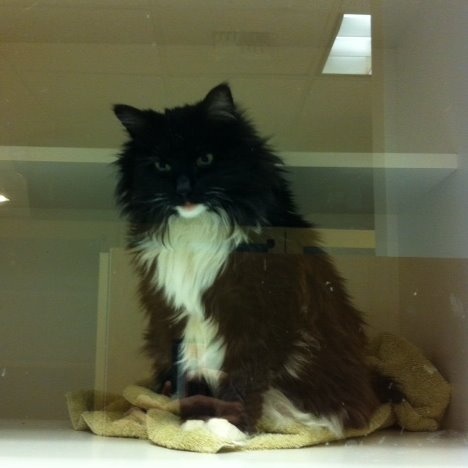Blog
A Cat Cancer Success Story
November 21, 2014

She was the kind of cat who we really hoped would never need our help again. As an abandoned kitten, Ellie and her brother dodged death from the feline distemper virus thanks to donations from our St. Francis Fund. The illness left her with some quirky neurologic symptoms, including hearing loss and unpredictable aggression. She was adopted and since then, every time she visited Cats Exclusive, she emitted piercing shrieks that resonated throughout the hospital, instantly identifying her to all the staff that knew her. Turning 14 years old this year, she had been happy and healthy in all other respects.
Seven months ago, Ellie’s owner brought her in for trouble swallowing and acting lethargic. Her exam revealed a severely enlarged lymph node in her neck. We performed a quick and non-invasive needle biopsy, and, within hours, a diagnosis of lymphoblastic lymphoma was confirmed. By the end of the day, we had completed Ellie’s blood tests and X-rays, consulted the owner, and chemotherapy had been started.
Lymphoblastic lymphoma is one of 2 common types of lymphoma seen in cats. The lymphoblastic form is more aggressive, with half the feline patients not surviving more than 6 months, even with treatment. No surgery is usually needed for a lymphoma patient, and the chemotherapy protocols can be remarkably well-tolerated by cats and dogs. The goal of veterinary medicine is to avoid extreme side effects from chemotherapy, so our patients often don’t experience hair loss, severe nausea, or weight loss in the way we associate with human cancer patients.
Staying true to her unusual nature, Ellie was intolerant of the standard doses of chemotherapy and, on one occasion, was rushed to Cats Exclusive on a Saturday during an unrelenting rainstorm. After experiencing vomiting and diarrhea after chemo, she had gone into shock and collapsed. She arrived hypothermic, pale, and on the brink of cardiac arrest. Despite the bustle of a typical Saturday, the technicians and doctors on duty rushed to help her. Astoundingly, by the next day, she had recovered her strength and was eating on her own.
In order to continue the fight against Ellie’s cancer, treatment had to go on. We consulted with Dr. Luminita Sarbu, a veterinary oncologist, to discuss ways to alter Ellie’s protocol to avoid the problems we had seen with her. The doses and timing of her chemo medication were changed, and we pushed onward. Ellie was also very difficult to give pills to, and her owner was a sweet older woman who lived alone. We needed to have a treatment plan that could reasonably be carried out without anyone getting hurt.
Ellie completed the hardest part of her chemotherapy and never looked back. She experienced a full remission starting one week after treatment was begun, and has maintained that. She will receive the last dose of her injectable chemotherapy soon and will be continued on daily oral Prednisolone for the rest of her life. She never lost any hair, never needed extended time in the hospital, and didn’t lose significant weight. Her shrill cry is just as spooky as ever, but now it is a sign of her amazing resilience.



